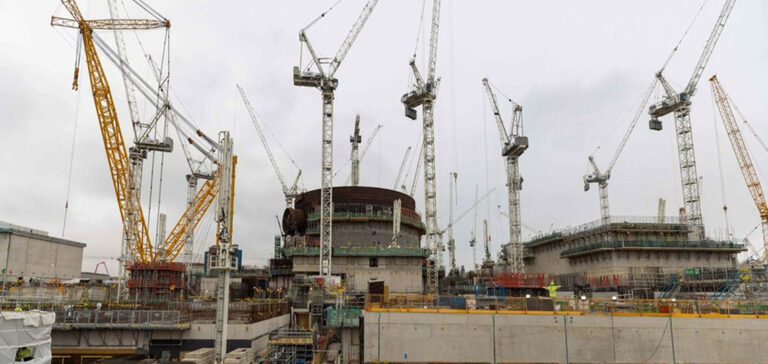Six companies have been shortlisted to build nuclear reactors following the UK tender. These include the UK’s Rolls Royce and France’s EDF. Other shortlisted companies include the GE-Hitachi alliance and the Americans Holtec, NuScale Power and Westinghouse.
The decision marks a crucial step in the UK’s plans to diversify its energy supply and meet its targets for reducing carbon dioxide (CO2) emissions. These smaller nuclear reactors are seen as a more flexible and affordable solution than traditional nuclear power plants.
An ambitious energy strategy
Rishi Sunak’s Conservative government had launched this tender earlier this year to select companies to build small nuclear reactors, a key element of its energy supply and decarbonization strategy, given the challenges of building traditional nuclear power plants. In March, London announced its commitment to spend £210 million (€242 million) on this small-scale power plant project.
The Conservative party statement stressed the importance of the initiative, saying it “will result in billions of pounds of investment in the UK and will generate thousands of jobs.” The announcement comes at a time when the opposition Labour Party is comfortably ahead in the polls ahead of next year’s general election.
The UK is committed to achieving carbon neutrality by 2050, an ambitious target that requires significant measures to reduce CO2 emissions. One of the main strategies for achieving this is to promote clean, sustainable energy sources, and nuclear power falls into this category.
Unlike thermal power plants, which burn fossil fuels, nuclear power plants produce no CO2 during electricity generation. This makes it an attractive option for reducing greenhouse gas emissions. Small modular reactors are even more advantageous because they are easier to finance and deploy than traditional nuclear power plant projects, such as Sizewell C and Hinkley Point C, both promoted by EDF.
Investment in nuclear power
Former Prime Minister Boris Johnson’s government gave the go-ahead in August 2022 for Sizewell C’s funding, confirming a £700 million (over €800 million) investment. The plant, which is to comprise two 3.2 gigawatt (GW) EPR reactors, is expected to cost a total of between £20 and £30 billion (€23 and €35 billion). However, production is not due to start until 2035, which means that the UK will not immediately benefit from its energy contribution.
In comparison, small modular reactors represent a faster option for increasing the country’s energy capacity. Although they also take time to develop, they could be operational by the early 2030s, offering a more agile solution for meeting growing energy demand while reducing CO2 emissions.
In summary, the UK has taken an important step in its commitment to nuclear power by announcing the finalists for the construction of small nuclear reactors. This decision is part of the country’s overall strategy to diversify its energy supply, reduce CO2 emissions and achieve carbon neutrality by 2050. Small modular reactors offer a promising solution to meet these objectives, providing a clean and agile energy source for the UK’s future. The country is looking forward to the announcement of the winners of this tender in the spring, paving the way for a more sustainable energy future.






















